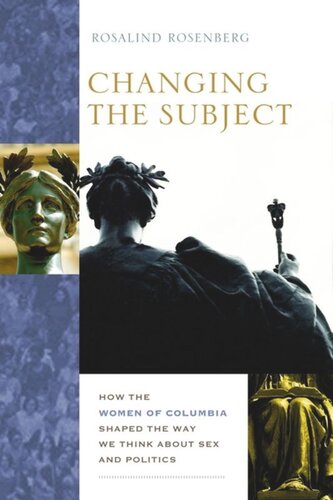

Most ebook files are in PDF format, so you can easily read them using various software such as Foxit Reader or directly on the Google Chrome browser.
Some ebook files are released by publishers in other formats such as .awz, .mobi, .epub, .fb2, etc. You may need to install specific software to read these formats on mobile/PC, such as Calibre.
Please read the tutorial at this link: https://ebookbell.com/faq
We offer FREE conversion to the popular formats you request; however, this may take some time. Therefore, right after payment, please email us, and we will try to provide the service as quickly as possible.
For some exceptional file formats or broken links (if any), please refrain from opening any disputes. Instead, email us first, and we will try to assist within a maximum of 6 hours.
EbookBell Team

0.0
0 reviewsSurmounting a series of social and institutional obstacles to gain access to Columbia University, women played a key role in its evolution from a small, Protestant, male-dominated school into a renowned and diverse research university. At the same time, their struggles challenged prevailing ideas about masculinity, femininity, and sexual identity; questioned accepted views about ethnicity, race, and rights; and thereby laid the foundation for what we now know as gender.
This remarkable story begins in the years following the Civil War, when reformers—emboldened by the egalitarian rhetoric of the post–Civil War era—pressed New York City's oldest institution of higher learning to admit women in the 1870s. Their effort failed, but within twenty years Barnard College was founded, creating a refuge for women scholars at Columbia, as well as an academic beachhead "from which women would make incursions into the larger university." By 1950, Columbia was granting more advanced degrees to women and hiring more female faculty than any other university in the country.
In Changing the Subject, Rosalind Rosenberg shows how this century-long struggle transcended its local origins and contributed to the rise of modern feminism, furthered the cause of political reform, and enlivened the intellectual life of America's most cosmopolitan city. Surmounting a series of social and institutional obstacles to gain access to Columbia University, women played a key role in its evolution from a small, Protestant, male-dominated school into a renowned research university. At the same time, their struggles challenged prevailing ideas about masculinity, femininity, and sexual identity; questioned accepted views about ethnicity, race, and rights; and thereby laid the foundation for what we now know as gender. From Lillie Devereux Blake, Annie Nathan Meyer, and Virginia Crocheron Gildersleeve in the first generation, through Ruth Benedict, Margaret Mead, and Zora Neale Hurston in the second, to Kate Millett, Gerda Lerner, and Ruth Bader Ginsburg in the third, the women of Columbia shook the world.